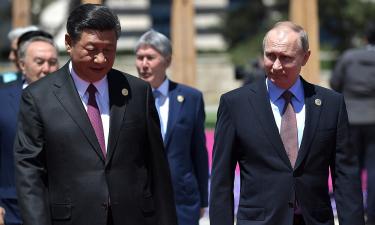Victorious anti-drug struggle without a chance for a victory
When English people “discovered” China, they thought it would be expedient to have commercial relations with it. Chinese were selling porcelain, silk, tea, but they were not willing to buy fabric or mechanical wonders. Britons had to pay with silver, which led to misbalance of import and export: China was self-sufficient with its huge territory and various handicrafts. The situation was hopeless, but a genius of market idea made up super-goods with a very high consumer demand – the demand on opium. The import of opium reached 30 thousand boxes (50-60 kilos in each) by the 1830s, despite the bans on the part of the imperial power. England won the commercial balance.
A high-ranking Chinese official Lin Zexu, who was sent to Guangzhou by the Chinese emperor for seeking justice, wrote a letter to the English Queen, trying to add something moral and ethical to the issue of commercial and market relations between England and China. “Since this profit is realized in China and is in fact taken away from the Chinese people, how can foreigners return injury for the benefit they have received by sending this poison to harm their benefactors? ..Heaven is furious with anger, and all the gods are moaning with pain! It is hereby suggested that you destroy and plow under all of these opium plants and grow food crops instead, while issuing an order to punish severely anyone who dares to plant opium poppies again....”
Lin Zexu’s arguments were perceived in Europe as naive and unconvincing. Whether the goods were “good” or “bad” - it was determined with consumer demand, not with consumer health. Lin abolished dens, arrested officials that were addicted to drugs, arranged public executions. He even confiscated over 20 thousand boxes of opium. The boxes were emptied, opium was covered with quicklime and water, and the foamy liquid was flowing in the sea. Those eliminating works were going on for 22 days, since there were 1188 tons of the drug! England sent gunboats in return in order to make China pay the compensation and realize the laws of free trade. Since it was going about free opium trade, the wars between China and England (1839-1842) and then between England and France (1856-1860) were registered in history as opium wars.
Over three percent of the Chinese people were drug addicts 111 years after Lin’s action. The government of the People’s Republic of China, which appeared at that time, started getting rid of the drugs, destroying dens, arresting drug dealers. There were some 80 thousand people convicted and 800 of them were sentenced to death penalty. Drug addiction was gone for three years, but then it came back again. The White Book for drugs, which was announced in China in December of 2001 said: “Since the late 1970s, the illicit international narcotics tide has constantly invaded China, and criminal drug-related activities touched off by transit drug trafficking have re-emerged.” I would like to remind you here that the session of the Central Committee of the Communist Party of China, which approved the course of reforms and openness, took place right around that time (in December of 1978). This is not an incidental coincidence.
The past experience helped the Chinese not to be taken by surprise: a full-scale repulse of the new drug aggression started growing in 1990, when the National committee for control over drugs was established. This was a huge organization of 25 departments, including the ministries for public security and healthcare, the central customs department. Similar structures appeared on the regional and provincial level.
Chinese severity is shocking for foreign mass media, the penalties are really tough: in Russia you are imprisoned for the period of up to seven years, but in China you will be executed for such crimes. They do not sentimentalize with drug addicts at all: they all must undergo medical treatment in the centers of compulsory rehabilitation. There are 746 such centers in China currently, over 224 thousand people were treated there only in 1999. In addition to that, there are 168 medical and labor centers with tougher regimes (120 thousand people were treated there in 1999). Nevertheless, the number of officially registered drug addicts increased sixfold during the period of 1999-2001. The share of severe drugs is progressing too: 70% of drugs is heroine, 80% of Chinese drug addicts are people under 35.
Underground drug business is prospering: a drug dealer’s income is huge, so the threat of being punished is like a commercial side effect to them. This risk is a lot less for drug dealers in comparison with Chinese miners: over five thousand miners died in China last year. But any truth should be perceived in comparison. We have to compare the past and the present situation in China, we have to compare China with other countries in order to understand what could happen without draconian measures.
From 1991 to 2001 the law-enforcement bodies of China seized some 150 thousand tons of heroine, opium, hemp, ecstasy. This is one-eighth in comparison with the opium that was destroyed by Lin Zexu within three weeks. The present population of China totals 1.3 billion, and an incomplete million of registered drug addicts is nothing in comparison with 1839 – two million of addicts for 300 million of population – or in comparison with 1949 – 20 million of addicts for 500-600 million. China’s numbers at present are very low in comparison with Russia – some three million of addicts for the population, which is eight times as less. Drug addiction in China is growing, but this is not like an uncontrollable natural disaster. But why can’t they repeat the victory of 1952? Because it was possible to have it due to peculiarities of those times: drug business incentives disappeared in the atmosphere of asceticism of those times. But when the architect of reforms Deng Xiaoping proclaimed that some people had a right to become rich earlier than others, everything changed within 20 years. The process of becoming rich earlier than others turned out to be rather energetic, and China is one of the “leading” countries of the world from the point of view of the gap between the income of richest the poorest people.
Spending money in China is honorable now, the fundamental motto of the economic policy is: “Consume!” Demand leads to sales, and sales lead to better production and economic prosperity. But the drug market is immortal from the economic point of view.
Andrey Krushinsky PRAVDA.Ru Beijing
Translated by Dmitry Sudakov
Subscribe to Pravda.Ru Telegram channel, Facebook, RSS!





